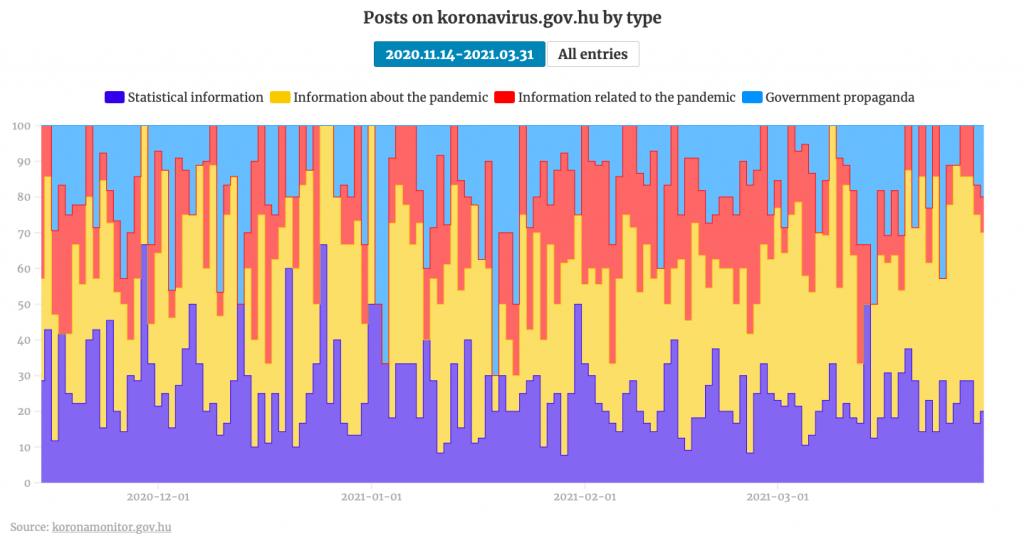The https://english.atlatszo.hu use cookies to track and profile customers such as action tags and pixel tracking on our website to assist our marketing. On our website we use technical, analytical, marketing and preference cookies. These are necessary for our site to work properly and to give us inforamation about how our site is used. See Cookies Policy
Official coronavirus website confuses information of public interest with government propaganda
We collected and analyzed all articles on the official Hungarian coronavirus information website (koronavirus.gov.hu) between November and March. The result didn’t come as much of a surprise in the light of our previous experiment half a year earlier. However, it is clear that the government’s information site is functioning as an important platform for spreading propaganda, especially when it comes to vaccination.

We analyzed all the entries on the official pandemic information portal in mid-November for the first time, only to find out that every sixth entry was propaganda:
Every sixth entry on the government’s official pandemic information page is propaganda
We gathered and analyzed all of the entries on government’s official pandemic information page up to November 13th.
Nearly 5 months passed since then, which means that a significant number of articles were published on the site, so we collected these entries once again. In this new period, coronavirus vaccines became an important aspect of the articles. This, of course, was no surprise, given the fact that the date of the first vaccine shipment was public from the end of November 2020, and since then, vaccination began to play a central role in government communication as well.
A total of 1,311 entries were published on the site between November 14, 2020 and March 31, 2021. We divided them into four distinct categories, just like last time: 1. statistical information 2. information about the pandemic, 3. information related to the pandemic, and 4. government propaganda. We also analysed exactly how many articles dealt with the topic of vaccination.
Government propaganda instead of objective information
In our new data collection, 40.1% of the posts were functioning as intended, i.e. to provide up-to-date and reliable information about the pandemic and to report on the current measures fighting against COVID-19. Since the launch of the site, this category has accounted for 39.64 percent of the posts.
There was also a relatively large amount of articles which contained statistical data (22.7%), usually updated at the beginning of the day, with news related to the global and domestic spread of the pandemic. Recently, regular information on vaccines was also published, such as the exact number of doses received from each vaccine producer. Overall, this category accounted for one-fifth of all the entries (19.79%).
It was followed by news that were only indirectly related to the current pandemic situation (19.4%): we included here the posts about certain economic measures in which the pandemic appeared in some way, but this was clearly not their central theme. Looking at all the entries, 23.15 percent of the articles belonged to this cathegory.
However, a significant part of the entries of the website clearly reflects the government’s political views. We considered those articles propaganda that reflects the political views of the current government, Fidesz-KDNP.
These articles usually blame Brussels for the slow vaccination rollout, or the opposition who (according to them) are constantly trying to undermine trust in certain, Eastern vaccines. But the propaganda entries also managed to link the topic migration to the COVID-19 pandemic. It was also common to report on economic success, in which the pandemic wasn’t even mentioned.
Altogether, 17.7% of the entries on the coronavirus portal were disguised or completely open propaganda in the last 5 months. This means almost one in five entries, which is a slight increase compared to our previous analysis between March and November 2020.
In the charts below, one can change with the filter buttons between the daily visualization of the time period of the new data collection and all the entries in monthly distribution.
Posts on koronavirus.gov.hu by type
Posts on koronavirus.gov.hu by type
Szijjártó’s name appeared most often in the articles
Of the more than 1,300 new entries, we also looked at the people whose names that appeared most often in these articles. At the top of the list stands Foreign Minister Péter Szijjártó, who has appeared 91 times on the website koronavirus.gov.hu in the past five months. He is followed by Chief Medical Officer Cecília Müller, but Róbert Kiss, another member of the Operational Group (a scientific consortium created in order to fight against the coronavirus) also spoke a lot.
Posts on koronavirus.gov.hu including a speaker
During these 5 months, the name of Prime Minister Viktor Orbán appeared in 55 articles, which is a slight decrease compared to our previous analysis. However, the fact that Mihály Varga, Minister of Finance, Katalin Novák, Minister without Portfolio for Family Affaires, and Sándor Bodó, Secretary of State for Employment Policy and Corporate Relations, were given a bigger role in the site than healthcare workers who can be considered a competent and reliable source in this regard (such as Béla Merkely, Miklós Kásler, or János Szlávik), which tells a lot about the problems about informing the general public about the pandemic.
Posts on koronavirus.gov.hu including a speaker
Regarding all 3597 entries of the website, the Foreign Minister spoke the most, a total of 275 times. He is followed by Cecília Müller with 224 posts, then Viktor Orbán with 154 posts. Béla Merkey, Miklós Kásler and János Szlávik had less posts about their remarks, only 18, 45 and 52 times respectively.
Posts on koronavirus.gov.hu including a speaker by months
Focusing on vaccination and the economy
It is also noticeable how the topic of vaccination became a more and more important topic: since 14 November 2020, 31% of the entries have dealt with vaccines in some form. Most of them, 255 out of 409 entries, were created specifically to inform the public about the vaccination, but there was also a large number of content in which the political views of the government could be noticed:
almost one in four entries about vaccination is propaganda, but it is also interesting that 43% of all entries containing unilateral government messages were somehow connected to the vaccines as well.
Posts on koronavirus.gov.hu related to vaccination
Posts on koronavirus.gov.hu related to vaccination
Posts on koronavirus.gov.hu that support government propaganda
In addition, the topic of economy also appeared more in the articles than it would have been necessary: according to our calculations, 21.6% of the news were related to some kind of perceived or real economic success.
Nevertheless, we could hear from the government several times that there is no problem with the provided data. A recent example is Zoltán Kovács’ reaction to an open letter signed by 28 media outlets – including Atlatszo – asking decision-makers to end healthcare censorship. According to the State Secretary of International Communication and Relations, media outlets that belong to „left-wing parties” (i.e. the opposition) are spreading fake news. He also added that the Operational Group informs the public every day about the coronavirus.
In other words, we can see that while most countries actually use the official pandemic information page to provide up-to-date information on the pandemic, in Hungary it seems as if the opposite is happening. The inaccuracy of the provided data, and the lack of transparency in communication has been important topics in our articles several times. Recently, we also looked at the main differences in the official pandemic information page in the region. In this comparison, Hungary didn’t reach a promising position:
The Hungarian coronavirus website is by far the least informative in the region
We compared the official coronavirus information sites of the neighbouring countries and the region as well, in order to find out exactly what kind of information is shared on these pages.
Translated by Zita Szopkó and Krisztián Szabó. The original, Hungarian version of this article can be found here.
Cover photo: Posts on koronavirus.gov.hu by type


